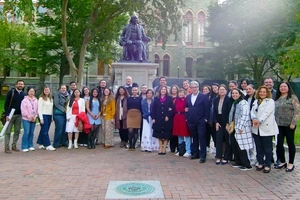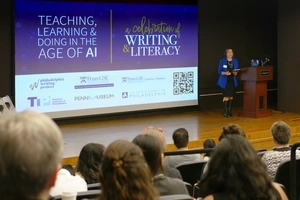
Ethnographic studies of Black Muslim youth in Philadelphia and multilingual teachers in Morocco have earned two Penn GSE doctoral students National Academy of Education/Spencer Dissertation Fellowships.
Irteza Binte-Farid and Gareth Smail received the prestigious fellowships, which support individuals whose dissertations show potential for bringing fresh and constructive perspectives to the history, theory, analysis, or practice of formal or informal education anywhere in the world.
Additionally, four Penn GSE graduates also received NAEd/Spencer Postdoctoral Fellowships.
Irteza Binte-Farid, a joint Ph.D. candidate in Penn GSE’s Literacy, Culture, and International Education Division and Penn’s department of Sociology, was recognized for her dissertation “My ancestors could do this, so I have to keep going with it”: Historical Narratives, Faith Practices, and Civic Engagement amongst Black Muslim Youth in Philadelphia.
Following 30 black Muslim youth in and out of history classrooms for two years in two Philadelphia charter schools, Irteza found that ethnic identities contributed to divergent interpretations of black history and the Black Lives Matter movement amongst African American and West African youth, while engaging in Islamic practices together created friendships that formed the basis for civic engagement.
Examples from her study can show teachers how acknowledging the diversity of black youth’s identities can counter essentialization of black experiences while also creating productive learning spaces. Teachers can empower students to challenge anti-Blackness and Islamophobia through historical examples. Additionally, black Muslim students can be taught to acknowledge historical difference, find common ground with peers through racial and religious bonds, and aspire for hopeful futures where black lives truly matter.
Gareth Smail, a Ph.D. candidate in Educational Linguistics, was recognized for his dissertation, Reconciling Multilingualisms: Teacher Identity and Language Diversity in Moroccan Public Schools.
Smail examined emerging linguistic diversity in Moroccan schools, where the long-marginalized Tamazight language and so-called international languages like French and English are being taught more widely in addition to the country’s post-independence emphasis on Standard Arabic.
He explores the dilemmas Moroccan teachers face as they enact this new state multilingualism. It focuses on a group of teachers tasked with introducing a new ‘creative’ language arts program in a community with its own longstanding vernacular bilingualism. It analyzes how the teachers—as simultaneously community members, agents of the state, and aspirants to a global class of professional educators—document and describe their own multilingual pedagogical practices as they attempt to establish legitimacy for their novel project.
The Penn GSE alumni among the newest group of postdoctoral fellows are:
Charles Davis III, an Assistant Professor in the University of Michigan’s Center for the Study of Higher and Postsecondary Education, will receive support for #PoliceFreeCampus: A Digital Ethnography of Black Campus-community Resistance, New Media Organizing, and Abolitionist Praxis for a Police-free Future.
Nicholas Limerick, an Assistant Professor of Anthropology and Education at Teachers College, Columbia University, will receive support for Contesting Expertise and the Struggle over Institutionalized Indigenous Education in Ecuador.
Roseann Liu, an Assistant Professor of Education Studies at Wesleyan University, will receive support for Designed to Fail: Why Racial Equity in School Funding is So Hard to Achieve.
T. Philip Nichols, an Assistant Professor of Literacy Education in the Department of Curriculum and Instruction at Baylor University, will receive support for The Mediated Mind: Cold War Politics, Human Ecology, and the Making of “Media Literacy”.
Media Inquiries
Penn GSE Communications is here to help reporters connect with the education experts they need.








